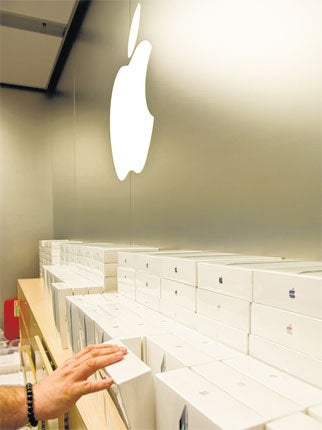Tech Talk: Do you really need that new iProduct or is it just short-term gadget lust?

A few weeks ago, I found myself being guided, as if by an invisible force, to an electrical shop in New Malden. It takes exceptional circumstances to put me in New Malden, and this occasion was no different; my brain (the invisible force in question) had decided I urgently needed to acquire the latest iPad.
I stood in the showroom, gazing at its glossy widescreen display as it collected greasy fingerprints from Saturday shoppers, and was about to reach for my credit card when I realised that I didn’t actually need it.
I wanted it, but was having trouble working out why. I had a first-generation iPad sitting at home that I didn’t use very much and had pondered selling, and yet here I was, about to spend money I didn’t have on another one.
A voice in my head told me to stop being stupid and go home. So I did. I’m not having a pop at the iPad; it’s a beautiful thing, and if customer satisfaction figures are to be believed, my ambivalence towards it puts me in the minority. But this was the most vivid experience I’ve had of desiring, almost fetishising, ownership of a gizmo for no reason I could put my finger on.
Later that day, I wondered why. My grandfather used to upgrade his car every year – his only real extravagance – but no, it couldn’t be a genetic thing.
It was more likely to be a combination of peer pressure, the urge to be an early adopter, and clever marketing on the part of Apple. Its mastery of the psychology of shopping imbues its products with this emotional pull, whether we need them or not.
I saw Stephen Fry performing at the Albert Hall last year, and during the show he triumphantly produced a white iPhone 4 (at that point unavailable to the masses) from his pocket to a gasp of admiration. Again, the iPhone 4 is a wonderful piece of technology, but, aside from its colour, it’s no different from the black iPhone 4 – and yet hundreds of people there coveted it. They may not have queued up overnight to get hold of one, but they still experienced that longing.
Apple, of course, doesn’t have a monopoly on this. Thousands of owners of various mobile phones, all stuck on 18- to 24-month contracts, make calls to mobile networks every day, urgently enquiring when their upgrade might be due. Our lack of interest in HDis finally turning to enthusiasm, and our lack of interest in 3D television may well follow suit. Through the Kindle, Amazon has finally persuaded the UK that electronic books are a neat idea, three years later than in the USA. These things make barely any difference to our lives, and the pace of technology is likely to make them obsolete in a laughably short space of time. But our hunger to own them is far stronger than it is for, say, a fridge.
To use one of my least favourite phrases: it’s a lifestyle thing.
So is gadget lust a bad thing? It keeps the economy ticking over, after all. You’d think that a combination of the recession and environmental concern about the disposal of redundant technology might have persuaded us to start hanging on to gadgets for longer, to postpone credit-card purchases, to get broken gear repaired.
But this doesn’t take into account our desire to save minuscule amounts of time, to imperceptibly improve our quality of life, to show off to friends that we can wirelessly play music from a mobile phone to four sets of remote speakers in each room. I’m as guilty of this as anyone – but it was sobering to experience that moment where excitement (“Look what this gadget can do!”) was replaced by rationalisation (“But I don’t really need it”). Mine just happened to come, of all places, in New Malden.
Join our commenting forum
Join thought-provoking conversations, follow other Independent readers and see their replies
Comments